Dr Aimie Brennan | Challenging the Changing Landscape of Initial Teacher Education
Initial teacher education in Ireland was reconceptualised in 2011 to embody a more practical, solution-based ethos in place of the traditional emphasis on foundational subjects such as sociology. Dr Aimie Brennan of the Marino Institute of Education and Dr Angela Canny of Mary Immaculate College undertook research to better understand the impact of these changes on the perspectives of students in the final year of initial teacher education.
Initial Teacher Education in Ireland: From Past to Present
In Ireland, initial teacher education has been grounded historically in the study of foundational, theoretical subjects such as sociology, history, philosophy, and educational psychology. This long-standing integration of disciplinary knowledge with practice has played a formative role in the development of initial teacher education, with the impacts understood to underpin improvements in the academic standing of universities.
In 2011, initial teacher education in Ireland was reconceptualised to embody a more practical, solution-based ethos. While the emphasis on foundational subjects from a policy perspective remains, in the classroom, the theoretical foundations of education have been considerably diminished.
What Does It Mean to Be a Teacher?
Dr Aimie Brennan of the Marino Institute of Education and Dr Angela Canny of Mary Immaculate College argue this shift in the ethos of teacher education has dramatically changed the educational landscape – and even what it means to be a teacher.
For the educators of teachers, Drs Brennan and Canny explain that the reconceptualised initial teacher education programme, with its increased focus on practice, has resulted in reduced contact time with students, the neglect of specialist subjects, and an inherent ‘lack in criticality’ afforded by the study of foundational disciplines.
While these developments in Ireland are consistent with those throughout Europe and the USA, it is clear that the impacts of such changes require exploration and consideration.
Addressing an Important Knowledge Gap
Drs Brennan and Canny point out that very little research has focused on the perspectives of students undergoing initial teacher education regarding the foundation disciplines. They addressed this knowledge gap by conducting an online survey of final-year initial teacher education students at an Irish College of Education. The questionnaire sought the views of students about the value placed on the sociology of education within the programme and also the extent to which they felt the study of the sociology of education had enabled them to reflect critically on critical themes, such as racism and inequality.
Out of a possible 520 respondents invited to take part, 138 students completed the survey, representing a response rate of 27%, broadly in line with average survey response rates across different disciplines.

Motivations for Engaging
Analysis of the respondents confirmed that attendance at lectures was good (with over 60% of students attending the majority of lectures over the course). When asked about their motivations for attendance, just under 90% of students reported academic concerns (e.g., not wanting to lose marks, and wanting to perform well on assignments). A smaller proportion (~66%) mentioned having a specific interest in the sociological content of lectures.
Students were broadly positive about the value of studying sociology as part of their initial teacher education programme. Notably, the clear majority (76%) perceived a ‘sociological lens’ as ‘useful’ and/or ‘very useful’ for addressing issues surrounding equality and fairness of access, and also useful in supporting tolerance for diversity (70%). Interestingly, sociology was perceived as less useful in terms of teaching core aspects such as literacy, numeracy, the Irish language, science, and the integration of digital skills.
Development of Student Teacher Identity
One of the aims of the foundation disciplines in initial teacher education (particularly the sociology of education) is to make a valuable contribution to the development of each student’s identity as a teacher. This incorporates the development of critical thinking about and acting upon educational issues, including social justice and equity.
With this in mind, students were asked how often they would discuss issues raised in the sociology of education lectures with their peers. Perhaps surprisingly, given the engagement in sociology teaching, almost 70% reported ‘never’ or ‘almost never’ discussing such issues outside of class. Drs Brennan and Canny take this to suggest that the academic study of sociology is not being fully integrated into the day-to-day lives of students. Consistent with this was the finding that only ~40% of students felt that the discussions in lectures were beneficial to their own professional development. Furthermore, in most aspects, the sociology of education teaching was not felt by students to challenge or change stereotypes about inequality.
The Value of the Sociology of Education
Despite the emphasis on foundation disciplines from a policy perspective, when students were asked to what extent the sociology of education was integrated with their professional studies, over half indicated that it was ‘not very’ or ‘not at all’ integrated, and only 20% felt it was ‘integrated’/’very integrated’. Further exploration by Drs Brennan and Canny revealed that students found it difficult to relate the sociological content to the primary curriculum or their daily practice. The researchers also found that the perceived relevance of sociology was specific to the curricular area, meaning that it was seen as highly relevant for Religious Education but not Physical Education or Mathematics, for example. Notably, when asked about potentially integrating sociology into these areas, students were broadly positive of this suggestion at a conceptual level.
In terms of professional placements (i.e., in schools), just over one-third of students felt that the sociology of education had been integrated. While the majority of students did not feel they typically utilised their sociological knowledge in this professional context, over half reported it having an impact on helping them interact with children and their parents.
A New Conceptualisation of Teaching
Drs Brennan and Canny suggest that the fundamental shift in focus in initial teacher education has made the task of linking theory to practice more difficult for students. Their research points to students having a fragmented view of how best to apply their theoretical learning to practical application in the classroom.
This raises the question of how educators can bring sociology to the fore in terms of initial teacher education. Drs Brennan and Canny call for teacher educators to work together to provide an integrated experience for students. In terms of practical next steps, they propose that small group teaching to facilitate critical reflection, case study, and problem-based learning would facilitate the application of a theoretical lens to educational issues. They also point to the provision of simple signposts to encourage self-engagement and reflection in students, and, most importantly, create the space needed for transformation. In doing so, Drs Brennan and Canny now call for the ‘conceptualisation of teaching as complex, interpretive, nuanced and intellectual’ in initial teacher education.
SHARE
DOWNLOAD E-BOOK
REFERENCE
https://doi.org/10.33548/SCIENTIA1148
MEET THE RESEARCHER

Dr Aimie Brennan
Marino Institute of Education, Dublin, Ireland
In 2014, Dr Aimie Brennan completed her PhD at University College Cork, Ireland. Having undertaken various academic roles, she is now the Dean of Education, Policy and Practice, Senior Lecturer in Education, and Coordinator of Masters Programmes at Marino Institute of Education. With expertise in the sociology of education and research, Dr Brennan lectures in policy and education research methods as part of teacher education programmes. Founder of the Student and Teacher Education Research project, she is editor of the only national peer-reviewed journal of student-teacher research and producer of the STER podcast series. She has been the principal investigator on a range of projects funded by community, education and statutory agencies in Ireland and abroad. Dr Brennan is an active contributor to the higher education community as an executive member of the Education Studies Association of Ireland, the Teacher Education Policy in Europe Committee, the National Student Engagement Advisory Group and as convener of the Pedagogy of Sociology in Professional Practice Study Group of the Sociological Association of Ireland.
CONTACT
E: Aimie.Brennan@mie.ie
W: https://www.mie.ie/en/about_us/staff_directory/dr_aimie_brennan.html

Dr Angela Canny
Mary Immaculate College, Limerick, Ireland
Dr Angela Canny is Assistant Dean, Faculty of Education, Mary Immaculate College. She is a sociologist and teacher educator at Mary Immaculate College, Limerick. She is a graduate of University College Dublin and the University of Warwick. She was awarded a Marie Curie Fellowship for her PhD research at the University of Warwick. At Mary Immaculate College, she teaches sociology of education to both undergraduate and postgraduate initial teacher education students and supervises both Master’s and PhD students. She is currently a board member of the Teacher Education Policy in Europe Committee, and is an active member of the Sociological Association of Ireland and the Education Studies Association of Ireland. Dr Canny has published a wide variety of reports, book chapters, and peer-reviewed articles in the area of school-to-work transition, the youth labour market, educational disadvantage, and teacher identity.
CONTACT
E: Angela.Canny@mic.ul.ie
W: https://www.mic.ul.ie/staff/213-angela-canny
FURTHER READING
A Brennan, A Canny, Problematising Irish student-teachers’ (dis)engagement with sociology of education in initial teacher education programmes, Teaching and Teacher Education, 2023, 130, 104173. DOI: https://doi.org/10.1016/j.tate.2023.104173
REPUBLISH OUR ARTICLES
We encourage all formats of sharing and republishing of our articles. Whether you want to host on your website, publication or blog, we welcome this. Find out more
Creative Commons Licence (CC BY 4.0)
This work is licensed under a Creative Commons Attribution 4.0 International License. 
What does this mean?
Share: You can copy and redistribute the material in any medium or format
Adapt: You can change, and build upon the material for any purpose, even commercially.
Credit: You must give appropriate credit, provide a link to the license, and indicate if changes were made.
SUBSCRIBE NOW
Follow Us
MORE ARTICLES YOU MAY LIKE
The BASIL CURE Initiative: Transforming How Students Learn Biochemistry Through Real Research
Teaching students how to think like scientists is a critical but challenging goal in biochemistry education. The Biochemistry Authentic Scientific Inquiry Lab (BASIL) initiative was conceived by Dr Paul Craig from the Rochester Institute of Technology and is led by colleagues across multiple institutions. They have developed an innovative curriculum that transforms traditional cookbook-style laboratory courses into authentic research experiences, also known as a Course-based Undergraduate Research Experience (CURE). By investigating real proteins with unknown functions, students learn essential scientific skills while expanding our knowledge of protein biochemistry.
Professor Jean-Anne Stewart | Making Virtual Action Learning Effective for Leadership Development
New research shows that virtual action learning can be just as beneficial as face-to-face sessions for developing leadership skills, when implemented thoughtfully. A UK study of over 300 senior leaders by Professor Jean-Anne Stewart of Henley Business School at the University of Reading found that with proper facilitation, virtual action learning enabled valuable peer support, actions and reflection time, even during the challenges of the COVID-19 pandemic.
Dr Charles Dziuban | Student Ratings: Skin in the Game and the Three-Body Problem
An ongoing concern in higher education is how to include the student voice in teaching. Dr Charles Dziuban has dedicated much of his career to examining student and faculty outcomes as well as gauging the impact of online, blended and lecture capture courses in universities in an effort to improve the educational experience for students. On the basis of his work, he now presents a model for effective teaching and evaluation based on capturing the student voice.
Professor Gregory D Foley | Empowering Citizens: The Importance of Quantitative Reasoning in Higher Education
Despite a growing emphasis on Quantitative Reasoning in education, particularly as universities develop courses that move beyond traditional math, its role in fostering critical citizenship remains underexplored. Professor Gregory D Foley’s research studies the perspectives of instructors on teaching Quantitative Reasoning at university and examines how these courses can promote critical citizenship. By evaluating practical teaching approaches, the study highlights the evolving role of quantitative reasoning in preparing students for thoughtful civic participation.





